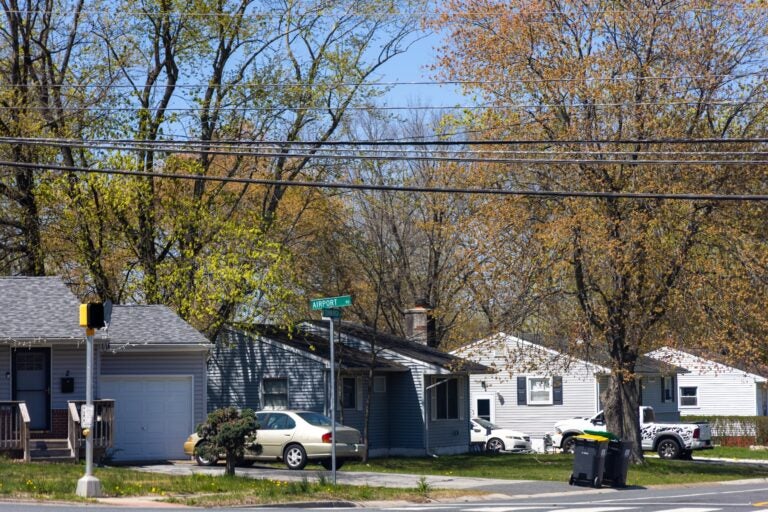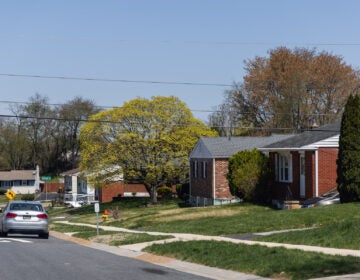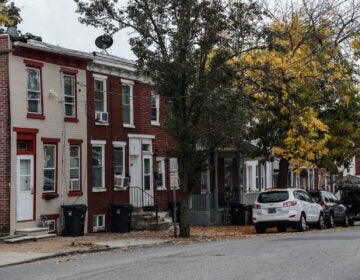Delaware lawmakers sharply question New Castle County officials in sometimes-tense property tax reassessment hearing
The hearing grew tense at times as New Castle County officials corrected a few of their answers to lawmakers.
Listen 1:02
Homes in New Castle, Delaware. (Kimberly Paynter/WHYY)
What are journalists missing from the state of Delaware? What would you most like WHYY News to cover? Let us know.
Delaware lawmakers grilled New Castle County officials in the third hearing legislators have held on its controversial property reassessment process.
Homeowners throughout the state face steep tax increases, in some cases up to thousands of dollars, after property values were reassessed for the first time in decades. Public outcry in New Castle County over the tax spikes prompted state lawmakers to pass limited legislative fixes and hold hearings.
This hearing was the first since the courts dismissed a lawsuit against the county, state and local school districts regarding a state statute allowing school districts to issue split residential and commercial tax rates for the 2025-2026 tax year.
New Castle County Attorney Aaron Goldstein and County Chief Financial Officer David Del Grande appeared before the joint legislative task force, saying they were now freer to answer lawmakers’ questions since the litigation had been resolved in their favor. County Executive Marcus Henry appeared before the committee in early October.
But Goldstein declined to answer whether New Castle County was actively considering trying to recover money paid to the third-party contractor Tyler Technologies, which did the property valuations for all three counties. New Castle County has said it paid Tyler $20 million for its appraisal work.
New timeline for updated tax bills
Lawmakers interrogated Goldstein and Del Grande on what information was included in the revised tax bills, who owns what data and possible remedies for over- and under-appraised properties.
New Castle County said the bills will now be mailed to taxpayers between Nov. 24 and Dec. 1. Revised tax data will be available on the county’s website starting Thursday. Payments are due by Dec. 31.
Del Grande said 63% of its tax bills remain unpaid. From July to October, the county has collected about $236 million for schools and nearly $53 million for the county. He said 3,900 appeals remain outstanding.
“Obviously, the switch of the deadline from September to now December has impacted the cash flow for both the school districts and the county,” he said. “We won’t have that fiscal impact until after the majority of these bills have been paid.”
Eligible property owners can enter into a payment plan, with due dates of Dec. 31, Feb. 27 and April 30.
The county officials drew the ire of state Rep. Kim Williams after she was told the answers to her questions, including the payment plan due dates were on the slideshow presentation. Goldstein later apologized for incorrectly saying the dates were listed there.
“Oh thank you for schooling me,” she said. “I looked and I just didn’t see it, so that’s why I asked.”
The terse exchange over the bills continued as lawmakers sought to clarify what information was being sent out. At first, the county officials said taxpayers would not see the split tax rates in the bill itself, but later corrected themselves. The county also clarified property owners would receive a supplemental bill, not a new one.
New Castle County has received criticism for not communicating effectively with taxpayers, state lawmakers and the other counties. The process has gone more smoothly in the two downstate counties.
The two staffers detailed numerous communication outreach strategies the county undertook to inform the public through the twists and turns of the reassessment process. The county has also created an open records webpage, where people can find reassessment documents. State Sen. Eric Buckson said they seemed to be righting the ship.
“I was somewhat critical, as others were, of the process New Castle County had applied,” he said. “But I want to appreciate and compliment you on what appears to be a recovery in midair. We’re trying to land the plane. It’s out of control, and it appears that we’ve got this thing in a stable situation, so that we can come in for a landing.”
Lawmakers also seek answers on how properties are valued, who owns the data
Aggravated New Castle County homeowners have pointed to their increased tax burden under Tyler’s valuations while many commercial properties saw decreases. Amazon saw its overall tax bill plummet from about $3.5 million last year to about $1 million this year, a $2.5 million decrease.
State Rep. Cyndie Romer asked county officials if they could provide more insight on why some homes in lower-income neighborhoods saw dramatic swings in values.
“What’s troubling for people is that, let’s drill down into the city of Wilmington thing,” she said. “It erred on the side of giving breaks to the biggest corporations and overassessing the poorest communities.”
Goldstein said the General Assembly could pass legislation more clearly defining what fair market value means.
“We ought to look at whether we think the common law needs to be updated or whether we’re satisfied with it, because this body has the absolute ability to change it,” he said.
New Castle County, like the other two counties, uses technologies purchased from Tyler. The counties own some of the data, but the company owns the data it uses to determine property values.
State Sen. Brian Pettyjohn said the lack of answers around how properties like Amazon were valued is leading to the public’s frustration.
“All of us went to school. All of us had teachers that said, ‘Show your work,’” he said. “If that’s not part of that transparent process, we’re still going to have questions, we’re still going to have concerns and we’re still going to have many members of the public that don’t trust what was done was completely right.”
New Castle County suggests recommendations for future property reassessments
County officials told the joint committee that for the next property reassessments, which by law must occur every five years, a statewide procurement process might make things easier. They also said the state should consider banning recording of nominal sale prices, a current practice where someone can purchase a home and file the sales price as $10.
State Rep. Kevin Hensley, who is also a realtor, said that custom started many years ago, when sales prices were published in the newspaper.
“People oftentimes didn’t want their transaction published in the newspaper, so settlement attorneys would do $10,” he said.
Hensley said while such a massive records update may prove a difficult task, contract sales prices could be found on county transfer tax documents.

Get daily updates from WHYY News!
WHYY is your source for fact-based, in-depth journalism and information. As a nonprofit organization, we rely on financial support from readers like you. Please give today.







